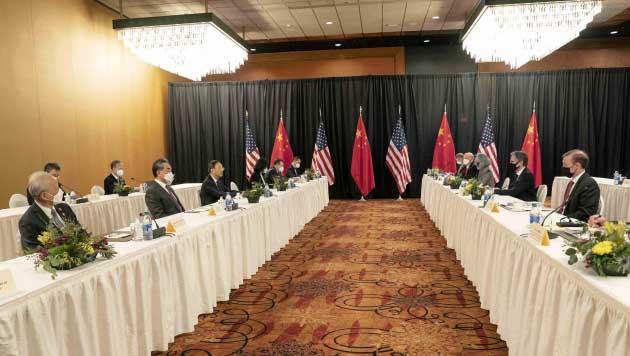China Net, April 15th, the US "Washington Post" website recently published a commentary article by Michael O'Hanlong, a senior foreign policy researcher at the Brookings Institution, saying that the US government's recent policy of excessively demonizing China is not good for the United States. The United States should Be vigilant about the possible consequences of excessive deterioration in US-China relations.

On March 18, 2021, Yang Jiechi, member of the Political Bureau of the CPC Central Committee and Director of the Office of the Central Foreign Affairs Commission, and State Councilor and Foreign Minister Wang Yi held a China-US high-level strategy in Anchorage with U.S. Secretary of State Blincoln and Assistant to the President for National Security Affairs Sullivan dialogue. Yang Jiechi and Wang Yi clarified China's relevant position in the opening remarks of the China-US high-level strategic dialogue. Photo by Xinhua News Agency reporter Liu Jie
The article pointed out that the recent hard-line attitude of the two parties in the United States towards China seems to be verifying the American proverb: “If something is worth doing, then it’s not too much to overdo it.” Although the Biden administration has stated that it must be in certain areas. Competing with China, cooperating with China in some areas, and confronting China in other necessary areas, but Washington seems to be more willing to overemphasize confrontation with China. One of the important manifestations is that it listed China as a country that committed the so-called "genocide" crimes based on the so-called "Xinjiang human rights issue."
The article stated that the use of "genocide" on China is extremely inappropriate, whether from the perspective of history or from the perspective of legitimacy, and it is suspected of deliberately fanning the flames on the deterioration of US-China relations. The claim that China has committed the so-called "genocide" crime is just a symbol of the US policy toward China that gradually highlights the trend of demonizing China, which reflects that the US is going further and further under the dangerous convergent thinking.
The article traces the origin of the term "genocide". In 1944, Polish lawyer Rafael Lemkin first proposed the term "genocide" in the context of Germany's brutal massacre of Jews. As the former U.S. ambassador to the United Nations Samantha Bauer stated in her book "Problems from Hell," the concept of "genocide" also originated from the deliberate massacre of hundreds of thousands of Armenians by the Ottoman Empire in 1915. Article 2 of the "Convention on the Prevention and Punishment of the Crime of Genocide" promulgated by the United Nations in 1948 officially announced its definition: According to the convention, "genocide refers to the intention to destroy a nation, ethnic, racial or religious group in whole or in part. Acts, including killing members of the group; causing serious physical or mental harm to members of the group; deliberately destroying the living environment of the group and partially or completely destroying the physical condition of the group members; taking measures to prevent the group from giving birth; using coercion Means to move children from one group to another."
The article believes that historically, the description of "genocide" is mostly the massacre of hundreds of thousands or even millions of people, while similar incidents have never happened to Uyghurs in China, and there is no evidence that China is planning to "destroy "Uighur. Therefore, the US government's accusation of China's so-called "genocide" is purely nonsense.
The article stated that the United States should correctly respond to the rise of China, and both sides need to make efforts to ease the current tense bilateral relations, and deliberate provocations will not work. The article criticized former U.S. President Trump for wielding tariff swords to suppress China during his tenure, and expressed regret that the Biden administration still retained these tariff policies.
In addition, the article also expressed concern about the U.S. government's military strategy against China, saying that the "National Security Strategy Report" and "2018 U.S. Defense Strategy Report" launched during the Trump administration brought the U.S. military strategy to China on the verge of losing control.
The article believes that the war plan formulated by the U.S. government is increasingly inclined to take the lead in the early stages of a hypothetical war. For example, an official in the former Obama administration publicly called on the U.S. to vigorously develop the sinking within 72 hours of the outbreak The military capability of 350 Chinese ships. What is worrying is that not only did the US government fail to make efforts to ease the bilateral situation, it also unreasonably labelled China as "genocide", which made it even more difficult for the US government to predict and deal with various crises that might arise in the future.
The occurrence of World War II and the Cold War made the world fully aware of the dangers of the appeasement policy, but the world often ignores the important experience of World War I, that is, when diplomatic methods are declining and military forces dominate the political situation, how big powers fall into war.
The article finally pointed out that, fortunately, Sino-US relations are still far from the dangerous situation of military confrontation. But the outbreak of World War I that year was nothing more than the Sarajevo incident that happened unexpectedly on June 28, 1914. Therefore, the US government needs to worry about the serious consequences of indulging in the continued deterioration of US-China relations.












